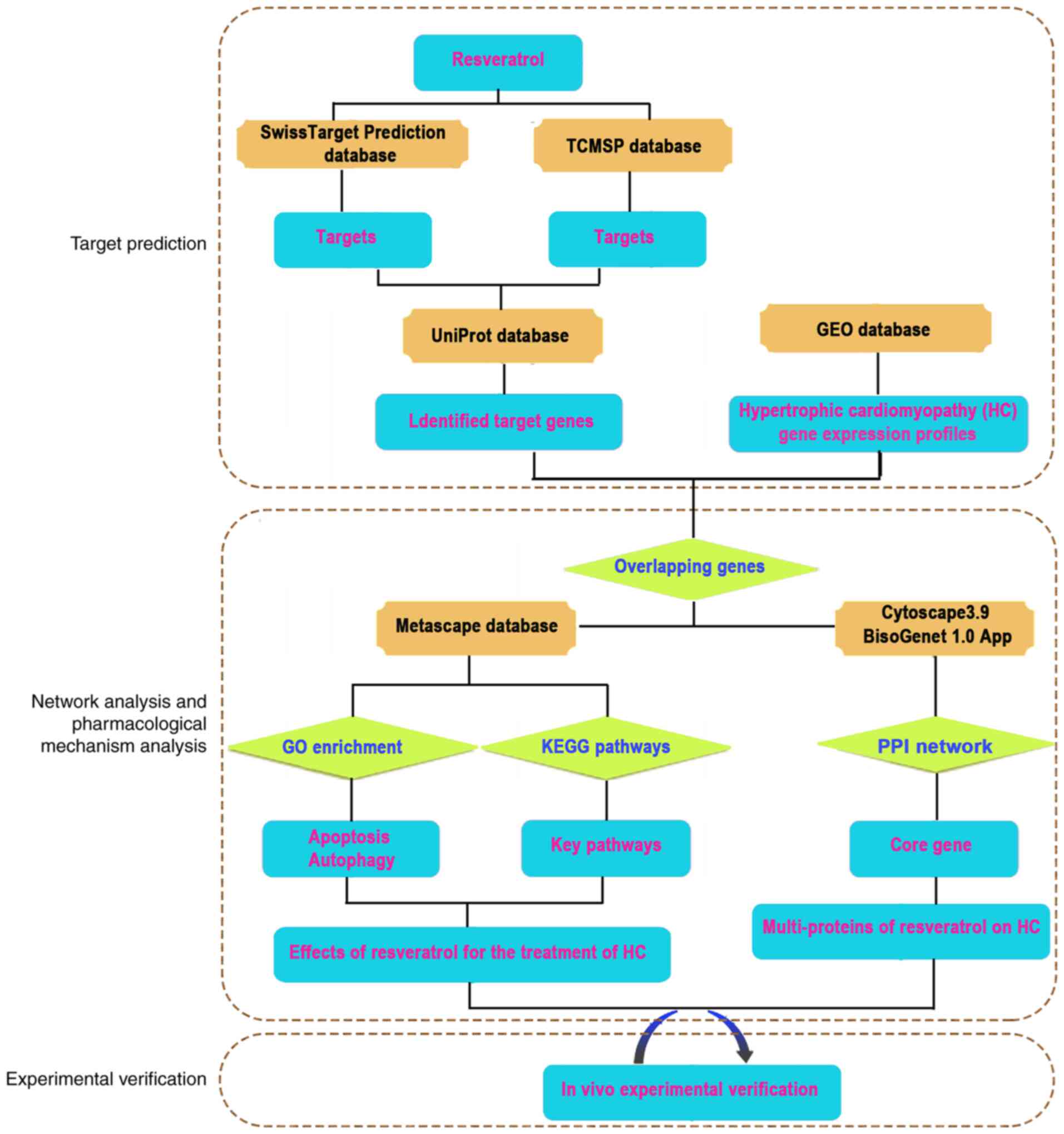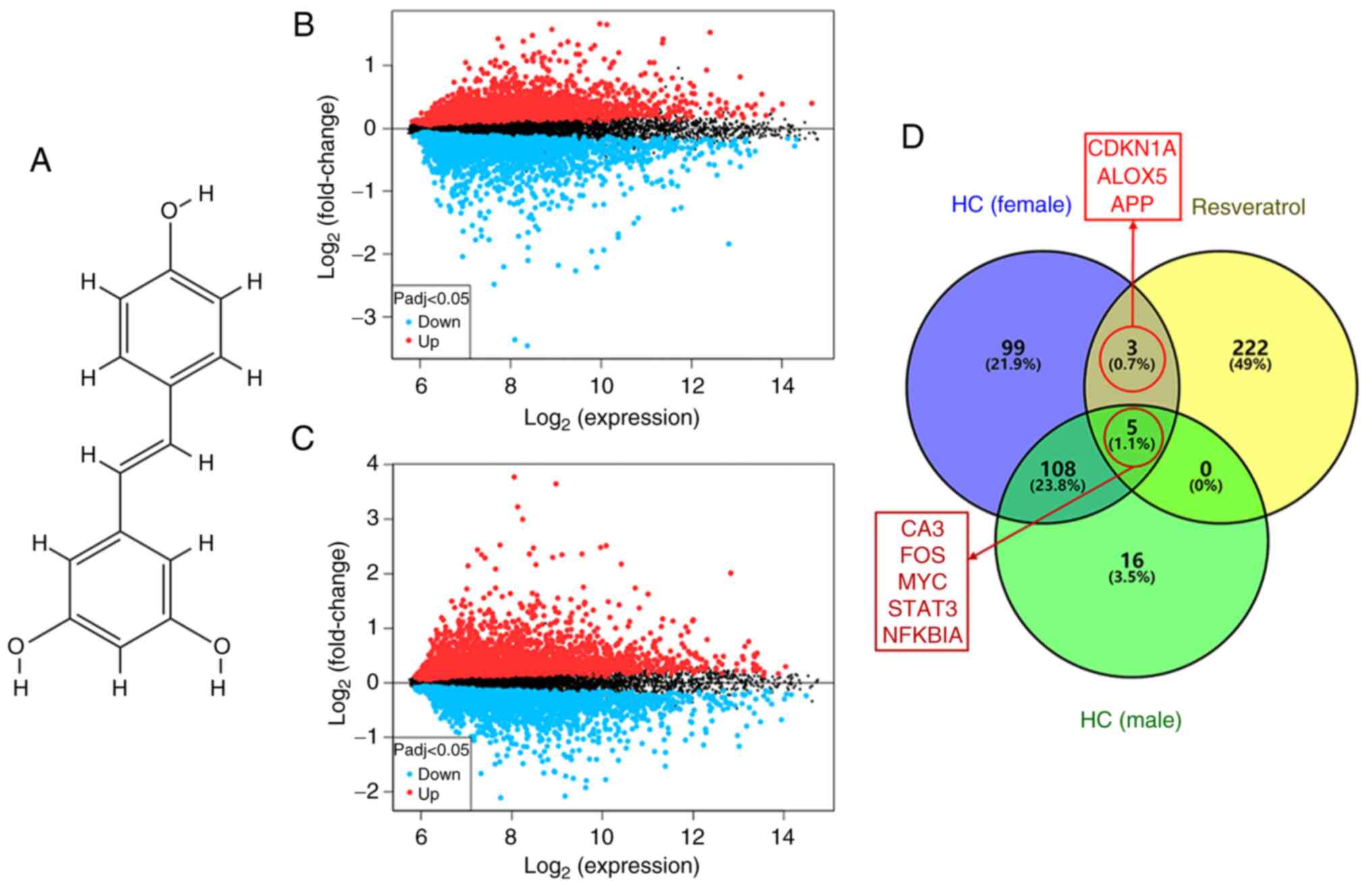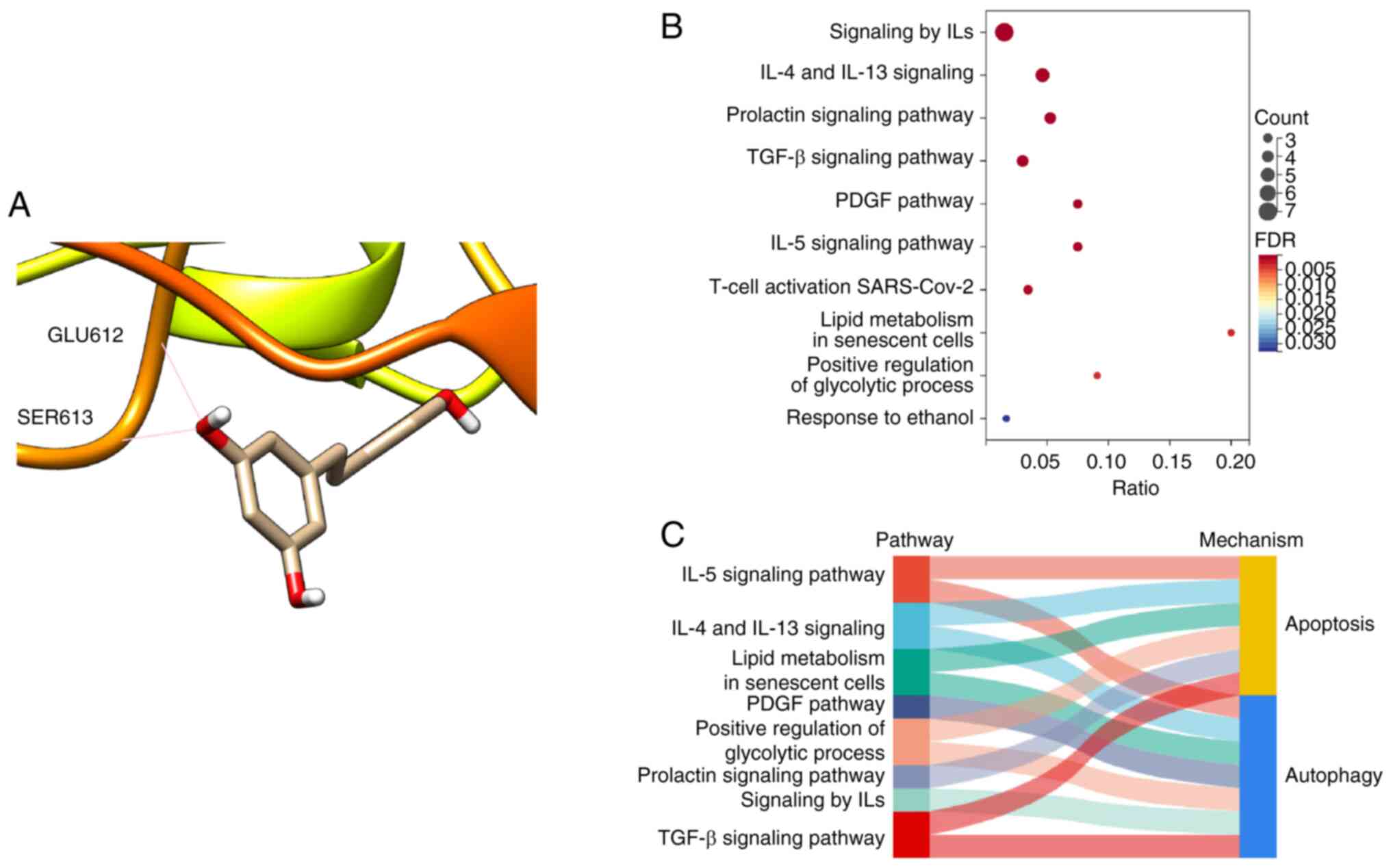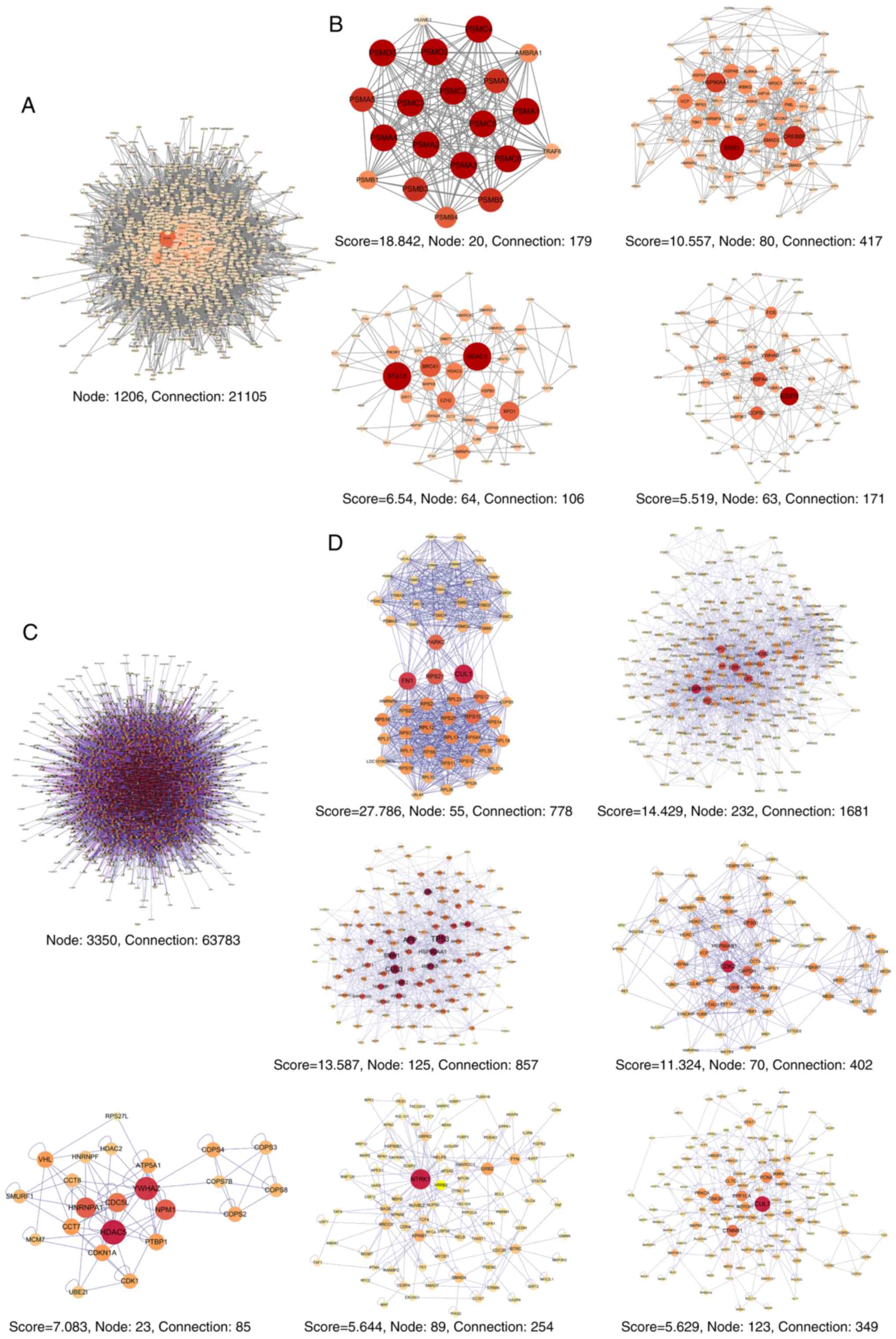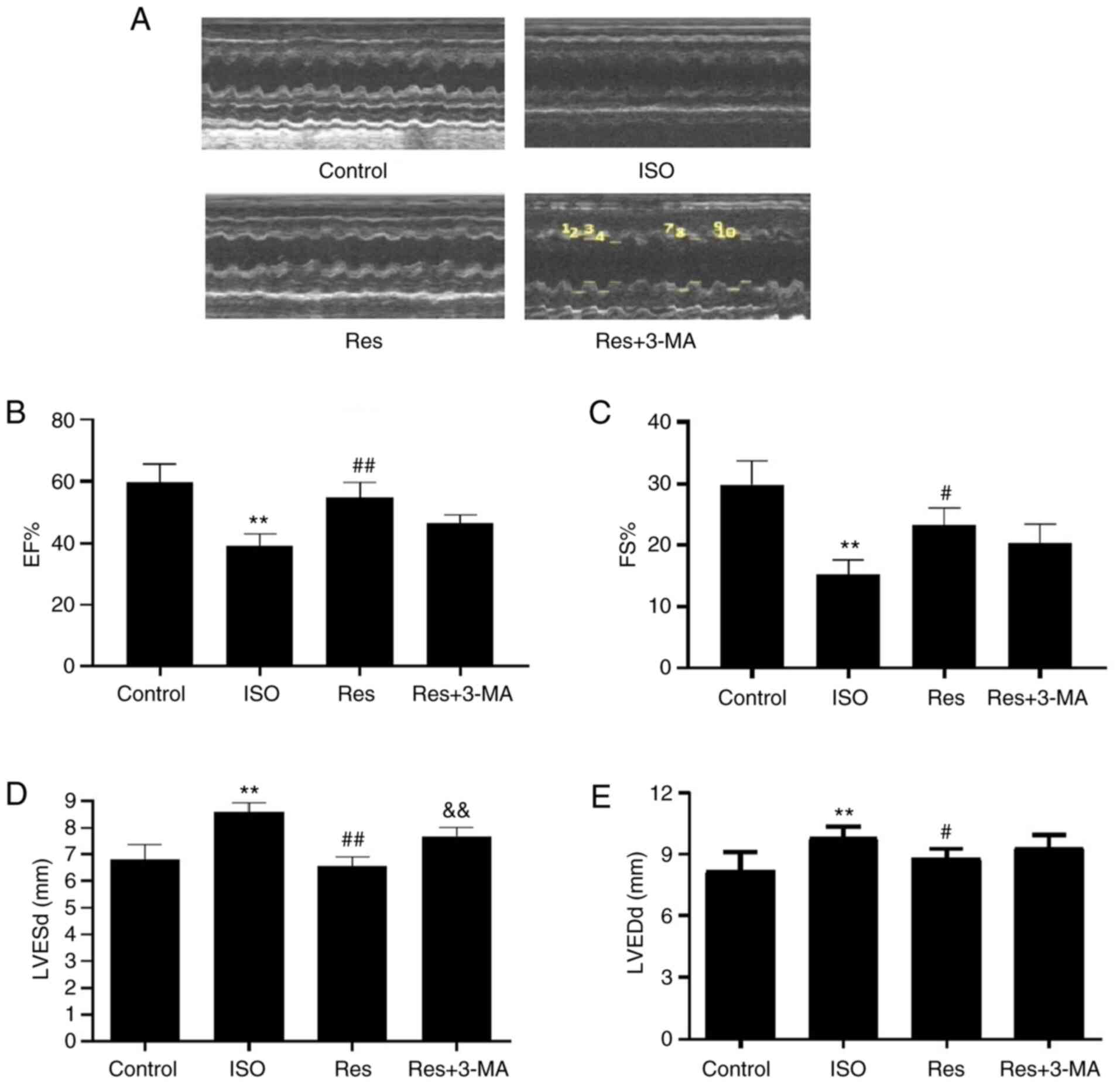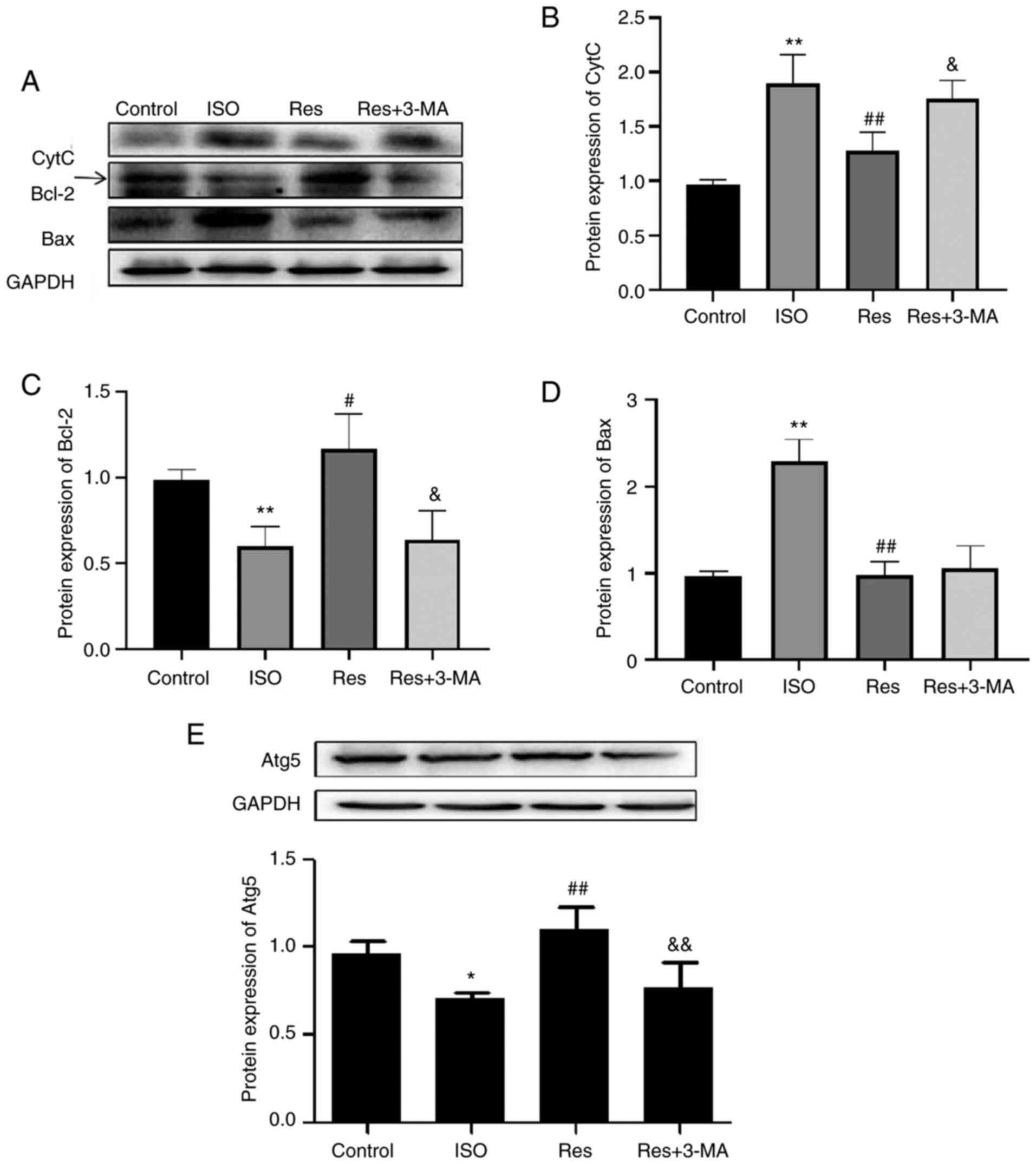|
1
|
Nakamura M and Sadoshima J: Mechanisms of
physiological and pathological cardiac hypertrophy. Nat Rev
Cardiol. 15:387–407. 2018. View Article : Google Scholar : PubMed/NCBI
|
|
2
|
Ott C, Jung T, Brix S, John C, Betz IR,
Foryst-Ludwig A, Deubel S, Kuebler WM, Grune T, Kintscher U and
Grune J: Hypertrophy-reduced autophagy causes cardiac dysfunction
by directly impacting cardiomyocyte contractility. Cells.
10:8052021. View Article : Google Scholar : PubMed/NCBI
|
|
3
|
Shaito A, Posadino AM, Younes N, Hasan H,
Halabi S, Alhababi D, Al-Mohannadi A, Abdel-Rahman WM, Eid AH,
Nasrallah GK and Pintus G: Potential adverse effects of
resveratrol: A literature review. Int J Mol Sci. 21:20842020.
View Article : Google Scholar : PubMed/NCBI
|
|
4
|
Tian B and Liu J: Resveratrol: A review of
plant sources, synthesis, stability, modification and food
application. J Sci Food Agric. 100:1392–1404. 2020. View Article : Google Scholar : PubMed/NCBI
|
|
5
|
Peñalver P, Belmonte-Reche E, Adán N, Caro
M, Mateos-Martín ML, Delgado M, González-Rey E and Morales JC:
Alkylated resveratrol prodrugs and metabolites as potential
therapeutics for neurodegenerative diseases. Eur J Med Chem.
146:123–138. 2018. View Article : Google Scholar : PubMed/NCBI
|
|
6
|
Chen C, Zou LX, Lin QY, Yan X, Bi HL, Xie
X, Wang S, Wang QS, Zhang YL and Li HH: Resveratrol as a new
inhibitor of immunoproteasome prevents PTEN degradation and
attenuates cardiac hypertrophy after pressure overload. Redox Biol.
20:390–401. 2019. View Article : Google Scholar : PubMed/NCBI
|
|
7
|
Wang Y, Yang SH, Zhong K, Jiang T, Zhang
M, Kwan HY and Su T: Network pharmacology-based strategy for the
investigation of the anti-obesity effects of an ethanolic extract
of zanthoxylum bungeanum maxim. Front Pharmacol. 11:5723872020.
View Article : Google Scholar : PubMed/NCBI
|
|
8
|
Lin X, Shao T, Huang L, Wen X, Wang M, Wen
C and He Z: Simiao decoction alleviates gouty arthritis by
modulating proinflammatory cytokines and the gut ecosystem. Front
Pharmacol. 11:9552020. View Article : Google Scholar : PubMed/NCBI
|
|
9
|
Wang W, Liu T, Yang L, Ma Y, Dou F, Shi L,
Wen A and Ding Y: Study on the multi-targets mechanism of triphala
on cardio-cerebral vascular diseases based on network pharmacology.
Biomed Pharmacother. 116:1089942019. View Article : Google Scholar : PubMed/NCBI
|
|
10
|
Wang J, Peng L, Jin L, Fu H and Shou Q:
Network pharmacology analysis of the identification of
phytochemicals and therapeutic mechanisms of paeoniae radix alba
for the treatment of asthma. J Immunol Res. 2021:96593042021.
View Article : Google Scholar : PubMed/NCBI
|
|
11
|
Daina A, Michielin O and Zoete V:
SwissTargetPrediction: Updated data and new features for efficient
prediction of protein targets of small molecules. Nucleic Acids
Res. 47((W1)): W357–W364. 2019. View Article : Google Scholar : PubMed/NCBI
|
|
12
|
UniProt Consortium: UniProt: The universal
protein knowledgebase in 2021. Nucleic Acids Res. 49(D1):
D480–D489. 2021. View Article : Google Scholar : PubMed/NCBI
|
|
13
|
Trott O and Olson AJ: AutoDock Vina:
Improving the speed and accuracy of docking with a new scoring
function, efficient optimization, and multithreading. J Comput
Chem. 31:455–461. 2010.PubMed/NCBI
|
|
14
|
Chen C, Chen H, Zhang Y, Thomas HR, Frank
MH, He Y and Xia R: TBtools: An integrative toolkit developed for
interactive analyses of big biological data. Mol Plant.
13:1194–1202. 2020. View Article : Google Scholar : PubMed/NCBI
|
|
15
|
Martin A, Ochagavia ME, Rabasa LC, Miranda
J, Fernandez-de-Cossio J and Bringas R: BisoGenet: A new tool for
gene network building, visualization and analysis. BMC
Bioinformatics. 11:912010. View Article : Google Scholar : PubMed/NCBI
|
|
16
|
Wang N, Zhang F, Yang L, Zou J, Wang H,
Liu K, Liu M, Zhang H, Xiao X and Wang K: Resveratrol protects
against L-arginine-induced acute necrotizing pancreatitis in mice
by enhancing SIRT1-mediated deacetylation of p53 and heat shock
factor 1. Int J Mol Med. 40:427–437. 2017. View Article : Google Scholar : PubMed/NCBI
|
|
17
|
Arocho A, Chen B, Ladanyi M and Pan Q:
Validation of the 2-DeltaDeltaCt calculation as an alternate method
of data analysis for quantitative PCR of BCR-ABL P210 transcripts.
Diagn Mol Pathol. 15:56–61. 2006. View Article : Google Scholar : PubMed/NCBI
|
|
18
|
Peng S, Lu XF, Qi YD, Li J, Xu J, Yuan TY,
Wu XY, Ding Y, Li WH, Zhou GQ, et al: LCZ696 ameliorates oxidative
stress and pressure overload-induced pathological cardiac
remodeling by regulating the Sirt3/MnSOD pathway. Oxid Med Cell
Longev. 2020:98150392020. View Article : Google Scholar : PubMed/NCBI
|
|
19
|
Wolf CM: Hypertrophic cardiomyopathy:
Genetics and clinical perspectives. Cardiovasc Diagn Ther. 9 (Suppl
2):S388–S415. 2019. View Article : Google Scholar : PubMed/NCBI
|
|
20
|
Halliday BP, Cleland JGF, Goldberger JJ
and Prasad SK: Personalizing Risk Stratification for sudden death
in dilated cardiomyopathy: The past, present, and future.
Circulation. 136:215–231. 2017. View Article : Google Scholar : PubMed/NCBI
|
|
21
|
Qiao Y, Zhu B, Tian A and Li Z: PEG-coated
gold nanoparticles attenuate β-adrenergic receptor-mediated cardiac
hypertrophy. Int J Nanomedicine. 12:4709–4719. 2017. View Article : Google Scholar : PubMed/NCBI
|
|
22
|
Galiniak S, Aebisher D and
Bartusik-Aebisher D: Health benefits of resveratrol administration.
Acta Biochim Pol. 66:13–21. 2019.PubMed/NCBI
|
|
23
|
Du L, Chen E, Wu T, Ruan Y and Wu S:
Resveratrol attenuates hydrogen peroxide-induced aging through
upregulation of autophagy in human umbilical vein endothelial
cells. Drug Des Devel Ther. 13:747–755. 2019. View Article : Google Scholar : PubMed/NCBI
|
|
24
|
Zhang X, Lu H, Xie S, Wu C, Guo Y, Xiao Y,
Zheng S, Zhu H, Zhang Y and Bai Y: Resveratrol suppresses the
myofibroblastic phenotype and fibrosis formation in kidneys via
proliferation-related signalling pathways. Br J Pharmacol.
176:4745–4759. 2019. View Article : Google Scholar : PubMed/NCBI
|
|
25
|
Li W, Yuan G, Pan Y, Wang C and Chen H:
Network pharmacology studies on the bioactive compounds and action
mechanisms of natural products for the treatment of diabetes
mellitus: A review. Front Pharmacol. 8:742017.PubMed/NCBI
|
|
26
|
Zhang W, Bai Y, Wang Y and Xiao W:
Polypharmacology in drug discovery: A review from systems
pharmacology perspective. Curr Pharm Des. 22:3171–3181. 2016.
View Article : Google Scholar : PubMed/NCBI
|
|
27
|
Liu TH, Tu WQ, Tao WC, Liang QE, Xiao Y
and Chen LG: Verification of resveratrol inhibits intestinal aging
by downregulating ATF4/Chop/Bcl-2/Bax signaling pathway. Based on
network pharmacology and animal Front Pharmacol.
11:10642020.PubMed/NCBI
|
|
28
|
Liu B, Palmfeldt J, Lin L, Colaço A,
Clemmensen KKB, Huang J, Xu F, Liu X, Maeda K, Luo Y and Jäättelä
M: STAT3 associates with vacuolar H+-ATPase and
regulates cytosolic and lysosomal pH. Cell Res. 28:996–1012. 2018.
View Article : Google Scholar : PubMed/NCBI
|
|
29
|
Wang W, Wang S, Liu T, Ma Y, Huang S, Lei
L, Wen A and Ding Y: Resveratrol: Multi-targets mechanism on
neurodegenerative diseases based on network pharmacology. Front
Pharmacol. 11:6942020. View Article : Google Scholar : PubMed/NCBI
|
|
30
|
You L, Wang Z, Li H, Shou J, Jing Z, Xie
J, Sui X, Pan H and Han W: The role of STAT3 in autophagy.
Autophagy. 11:729–739. 2015. View Article : Google Scholar : PubMed/NCBI
|
|
31
|
Cao X, Li B, Han X, Zhang X, Dang M, Wang
H, Du F, Zeng X and Guo C: Soluble receptor for advanced glycation
end-products promotes angiogenesis through activation of STAT3 in
myocardial ischemia/reperfusion injury. Apoptosis. 25:341–353.
2020. View Article : Google Scholar : PubMed/NCBI
|
|
32
|
Lu X, Zhu Z, Jiang L, Sun X, Jia Z, Qian
S, Li J and Ma L: Matrine increases NKG2D ligand ULBP2 in K562
cells via inhibiting JAK/STAT3 pathway: A potential mechanism
underlying the immunotherapy of matrine in leukemia. Am J Transl
Res. 7:1838–1849. 2015.PubMed/NCBI
|
|
33
|
Zhang YG, Zhu X, Lu R, Messer JS, Xia Y,
Chang EB and Sun J: Intestinal epithelial HMGB1 inhibits bacterial
infection via STAT3 regulation of autophagy. Autophagy.
15:1935–1953. 2019. View Article : Google Scholar : PubMed/NCBI
|
|
34
|
Wang N, Xin H, Xu P, Yu Z and Shou D:
Erxian decoction attenuates TNF-α induced osteoblast apoptosis by
modulating the Akt/Nrf2/HO-1 signaling pathway. Front Pharmacol.
10:9882019. View Article : Google Scholar : PubMed/NCBI
|
|
35
|
Goncalves GK, Scalzo S, Alves AP, Agero U,
Guatimosim S and Reis AM: Neonatal cardiomyocyte hypertrophy
induced by endothelin-1 is blocked by estradiol acting on GPER. Am
J Physiol Cell Physiol. 314:C310–C322. 2018. View Article : Google Scholar : PubMed/NCBI
|
|
36
|
Wang XQ, Xu ZT, Zhang GP, Hou N, Mo QX,
Wei J, Jiang X, Liu Y and Luo JD: Endophilin A2 attenuates cardiac
hypertrophy induced by isoproterenol through the activation of
autophagy. Am J Transl Res. 11:5065–5075. 2019.PubMed/NCBI
|
|
37
|
Shirakabe A, Zhai P, Ikeda Y, Saito T,
Maejima Y, Hsu CP, Nomura M, Egashira K, Levine B and Sadoshima J:
Drp1-dependent mitochondrial autophagy plays a protective role
against pressure overload-induced mitochondrial dysfunction and
heart failure. Circulation. 133:1249–1263. 2016. View Article : Google Scholar : PubMed/NCBI
|
|
38
|
Zhang Y, Ding Y, Li M, Yuan J, Yu Y, Bi X,
Hong H, Ye J and Liu P: MicroRNA-34c-5p provokes
isoprenaline-induced cardiac hypertrophy by modulating autophagy
via targeting ATG4B. Acta Pharm Sin B. 12:2374–2390. 2022.
View Article : Google Scholar : PubMed/NCBI
|
|
39
|
Luan Y, Luan Y, Feng Q, Chen X, Ren KD and
Yang Y: Emerging role of mitophagy in the heart: Therapeutic
potentials to modulate mitophagy in cardiac diseases. Oxid Med Cell
Longev. 2021:32599632021. View Article : Google Scholar : PubMed/NCBI
|
|
40
|
Li Y, Chen X, Li P, Xiao Q, Hou D and Kong
X: CD47 antibody suppresses isoproterenol-induced cardiac
hypertrophy through activation of autophagy. Am J Transl Res.
12:5908–5923. 2020.PubMed/NCBI
|
|
41
|
Wang SY, Ni X, Hu KQ, Meng FL, Li M, Ma
XL, Meng TT, Wu HH, Ge D, Zhao J, et al: Cilostazol alleviate
nicotine induced cardiomyocytes hypertrophy through modulation of
autophagy by CTSB/ROS/p38MAPK/JNK feedback loop. Int J Biol Sci.
16:2001–2013. 2020. View Article : Google Scholar : PubMed/NCBI
|
|
42
|
Xie C, Liu S, Wu B, Zhao Y, Chen B, Guo J,
Qiu S and Cao YM: miR-19 promotes cell proliferation, invasion,
migration, and EMT by inhibiting SPRED2-mediated autophagy in
osteosarcoma cells. Cell Transplant. 29:9636897209624602020.
View Article : Google Scholar : PubMed/NCBI
|
|
43
|
Tang Z, Takahashi Y, Chen C, Liu Y, He H,
Tsotakos N, Serfass JM, Gebru MT, Chen H, Young MM and Wang HG:
Atg2A/B deficiency switches cytoprotective autophagy to
non-canonical caspase-8 activation and apoptosis. Cell Death
Differ. 24:2127–2138. 2017. View Article : Google Scholar : PubMed/NCBI
|
|
44
|
Feng Q, Wang H, Pang J, Ji L, Han J, Wang
Y, Qi X, Liu Z and Lu L: Prevention of wogonin on colorectal cancer
tumorigenesis by regulating p53 nuclear translocation. Front
Pharmacol. 9:13562018. View Article : Google Scholar : PubMed/NCBI
|
|
45
|
Mariño G, Niso-Santano M, Baehrecke EH and
Kroemer G: Self-consumption: The interplay of autophagy and
apoptosis. Nat Rev Mol Cell Biol. 15:81–94. 2014. View Article : Google Scholar : PubMed/NCBI
|
|
46
|
Valcourt DM, Dang MN, Scully MA and Day
ES: Nanoparticle-mediated co-delivery of notch-1 antibodies and
ABT-737 as a potent treatment strategy for triple-negative breast
cancer. ACS Nano. 14:3378–3388. 2020. View Article : Google Scholar : PubMed/NCBI
|
|
47
|
Cusack CL, Swahari V, Hampton Henley W,
Michael Ramsey J and Deshmukh M: Distinct pathways mediate axon
degeneration during apoptosis and axon-specific pruning. Nat
Commun. 4:18762013. View Article : Google Scholar : PubMed/NCBI
|
|
48
|
Acuner Ozbabacan SE, Keskin O, Nussinov R
and Gursoy A: Enriching the human apoptosis pathway by predicting
the structures of protein-protein complexes. J Struct Biol.
179:338–346. 2012. View Article : Google Scholar : PubMed/NCBI
|















